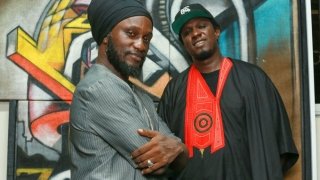
Creative Resistance: Shaping the Electoral Process through Urban Guerilla Poetry and Street Arts
Senegalese artists Simon and Docta, invited to the Saint Lawrence campus through the support of the Arts Collaborative grant, will share their experiences from Senegal. They will discuss how art forms like music, hip hop, graffiti, poetry, and theater can play a pivotal role in the democratic process. Through their artistic campaigns and socially engaged works, Simon and Docta will offer insights into how art can inspire citizens to participate actively in democratic societies. They will reflect on their use of urban guerilla poetry in the streets of Dakar during the 2024 presidential elections, emphasizing how they leveraged graffiti and rap to convey powerful messages to voters and encourage greater political engagement.
Biographies:
DOCTA
Docta (or “doctor” in urban Wolof) is one of the precursors of African graffiti and urban art in West Africa. With graffiti that combines wild style, bubble, 3D, vibrant colors, and sometimes African masks, he raises awareness about socio-political issues faced by Senegalese people and what he calls the “voiceless” or the “oppressed.” He painted murals in some of Dakar's poorest neighborhoods with messages in Wolof, such as “health has no price.” In 1994, he founded with other friends, Doxandem Squad, an international association of graffiti artists to promote graffiti art and urban culture in Senegal as well as internationally. Together they created FESTIGRAFF, one of the most well-known graffiti festivals in Africa today. FESTIGRAFF has been gathering hundreds of graffiti artists from around the world, through the creation of new art murals, graffiti works, street parades, training of young artists, conferences, roundtables, and community concerts.
SIMON
Simon is one of the most influential Senegalese hip-hop artists who co-founded the grassroots movement Y’en a marre (“Enough is enough”) with Docta. Y’en a marre was created to mobilize young people to vote by using what its members called “Urban Guerrilla Poetry,” revolutionary rap music performed in public spaces to create a New Type of Senegalese (NTS), a citizen who claims his/her rights and is aware of his/her civic responsibilities. The movement gained international recognition in 2012 when it helped prevent the former president Abdoulaye Wade to run for a third mandate.
Since 2000, rap and hip-hop artists in Senegal have been using their words and music to convey essential meanings and foster socio-political change at both the collective and the individual levels of the society. Simon confirms his role as “truth teller,” arguing that “the basis of the rapper is to inform people, to tell what happened, to sensitize [the] people.” He keeps defending civic responsibility and freedom of expression throughout his songs.
